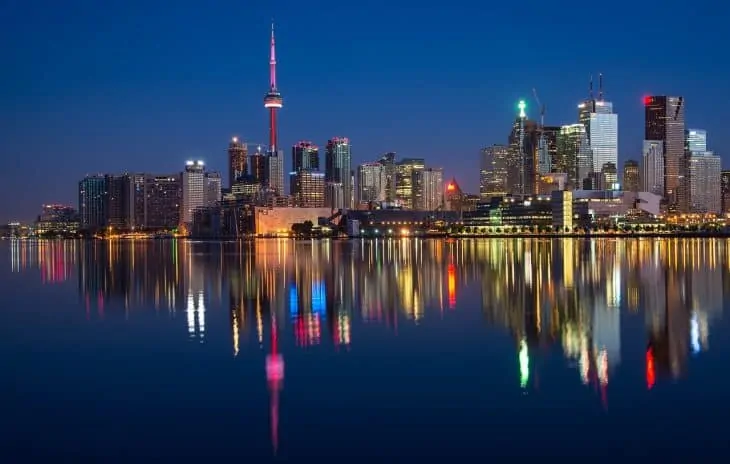
Known as the Land of Maple and poutine, Canada has captured hearts around the world for its friendly people and beautiful landscapes. With the Pacific Ocean in the west, the Arctic Ocean to the north, and the Atlantic Ocean in the east, Canada serves as a meeting point for many cultures. As the second biggest country on Earth, Canada also boasts different sights and centuries of heritage. However, what else is there to know about it? Get to know more about this country with these Canada facts.
- Canada’s land area is 9.985 million km² or roughly 3 times the size of India.
- Canada’s estimated Gross Domestic Product for the year 2020 is $1.971 trillion and about $50,000 per capita.
- During the 16th century, French and British explorers went to the land who later settled along the Atlantic coast.
- Canada’s capital, Ottawa, has a population of more than 800,000 as of 2020.
- Toronto is the largest city in the country (630.2 km²) and also the most populated, about 2.6 million people.
- Canada lies in the northern part of North America.
- By land area, Canada is bigger than the United States.
- The United States is the only bordering country of Canada by land.
- Before the European colonization, indigenous peoples occupied Canada for thousands of years.
- Canada is second to Russia as the world’s biggest country.
- Toronto is often mistaken as the country’s capital. However, Canada’s capital is Ottawa and not Toronto.
- The currency of Canada is called the Candian Dollar (CAD).
- Canada’s official languages are English and French.
- The people or citizens of Canada are called Canadians.
- The area code of Canada is +1, which is the same as the United States.
- Kim Campbell was the first and only female prime minister of Canada to date.
- Canada’s motto is “From sea to sea.”
- Canada’s motto describes how its land area touches both the Pacific and the Atlantic oceans.
- In general, the US does not require visas from Canadian citizens.
- As of today, Canada already had 23 prime ministers and its current prime minister is Justin Trudeau.
People believe that poutine came from Quebec in the 1950s.
The most popular widely-believed theory for poutine’s origin suggests that it came from a restaurant formerly called Le Lutin qui rit in Warwick, Quebec.

Canada ranks as the 228th most populated country in the world.
Canada has one of the lowest population sizes in the world, as most of the country is uninhabited. In fact, the whole country has a population size of just 4 people per sq km.
More than 70% of Canada's population has European origins.
Out of the country’s population, approximately 20 million people or 73% have European ancestors. Meanwhile, 18% are Asian, 5% are Indigenous, and the remaining 4% are African, Latin American, and Oceanian.
Canada has 3 main indigenous peoples.
The indigenous Canadians (known as Aboriginal Canadians, First Peoples, or Native Canadians) were the Métis, First Nations, and Inuit. As of the latest consensus, the First Nation has a population of 1,000,000, Métis has 600,000, and Inuit with 65,000.
The name Canada comes from an Iroquoian word.
Between 1534 and 1542, French-Breton explorer Jacques Cartier made three voyages across the Atlantic. During one of those journeys, he heard two captured guides speak the Iroquoian word (the language of the indigenous people in North America) “Kanata” which means ‘village.’ Eventually, in the 1950s, the name Canada started appearing in maps.
Canada has the most lakes of any country in the world.
With around 2 million lakes, Canada holds the most lakes in the world. Of all these lakes, around 563 cover more than 100 sq km. Some of these large lakes are Lake Superior and Lake Huron in Ontario and the Great Bear Lake in the Northwest.
Lake Superior is as big as Austria.
As both Canada and North America’s largest lake, Lake Superior measures roughly as big as the entire country of Austria. Additionally, Lake Superior is also the world’s largest freshwater lake by area.
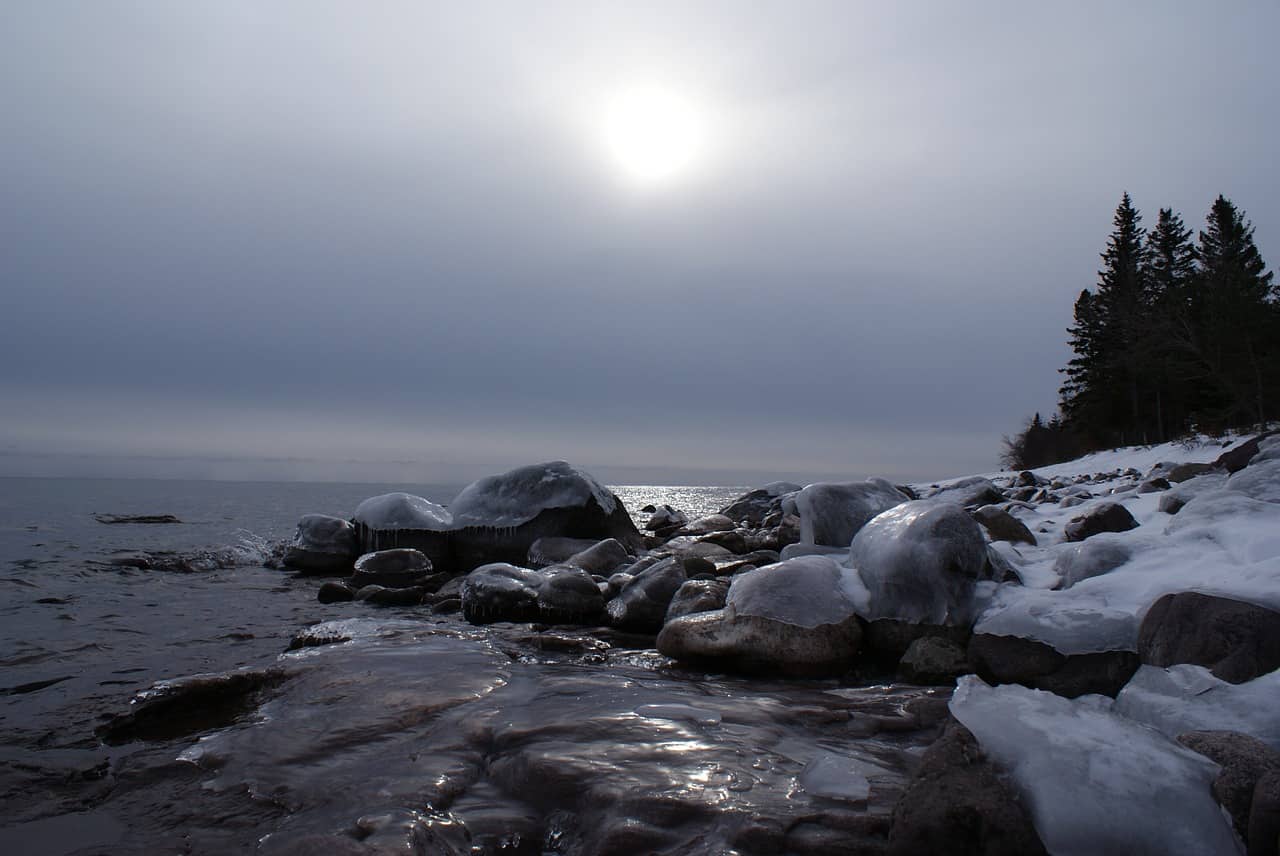
Ontario has a reputation among newlyweds.
For over 200 years, many newlyweds around the world have visited and enjoyed the magnificent view of the Niagara Falls. As a result, Ontario has been crowned as the “Honeymoon Capital of the World.”
Currently, Kraft Heinz is the leading food and beverage company in Canada.
Of all food companies, Kraft Heinz Canada is the biggest manufacturer in the country. Each year, it generates more than 13 billion Canadian dollars in sales. Some of its best-sellers are Philadelphia Cream Cheese, Kraft Peanut Butter, and Renée’s Salad Dressing. Currently Kraft Heinz Canada’s Headquarters lies in Toronto.
Canada's population is only 12% of the US population.
As of 2020, Canada has a population of around 37 million residents. Although Canada is much bigger than its bordering country by land area, the United States has over 328 million in population.
Lake Superior has a low species diversity.
Despite its size and namesake, Lake Superior is home to only 50 species of fish such as the chinook salmon, sea lamprey, white perch, brook trout, bloater, and round goby. Generally, Lake Superior is categorized as an oligotrophic lake for its low plant ecology and abundant oxygen in the deeper parts.
The Northern Territories offer the best view of the Northern Lights in Canada.
If you want to see the Northern lights from Canada, the Northern Territories would be your best bet. Typically, this area includes the Rocky Mountains, Vancouver, and Western provinces where the lights can be seen 240 nights a year. Usually, the lights are most visible from December to March.
Canada has been home to over 250 cultural origins.
One of the little-known Canada facts is how it’s first country in the world to have multiculturalism policy. This policy recognizes the country’s heritage and also enforces is protection. By this mandate, every Canadian must be given equal treatment and due respect regardless of cultural differences.
“O Canada” is the country's national anthem.
Originally called the Chant national, Sir Adolphe-Basile Routhier wrote the lyrics in Québec City, while French-Canadian-American musician Calixa Lavallee composed the music in 1890. Eventually, the song officially became the country’s national anthem in 1980.
"O Canada" has been changed a few times.
Despite using it for almost 40 years, Canada’s national anthem has been revised three times. The current version of its national anthem was written by Montreal lawyer Robert Stanley Weir.
The Canadian flag features an 11-pointed red maple leaf.
Also known as the Maple Leaf Flag, the Canadian flag has two main colors of red and white. Canada’s Maple Leaf Flag displays the 11-pointed red maple leaf as an emblem of unity, peace, and tolerance.
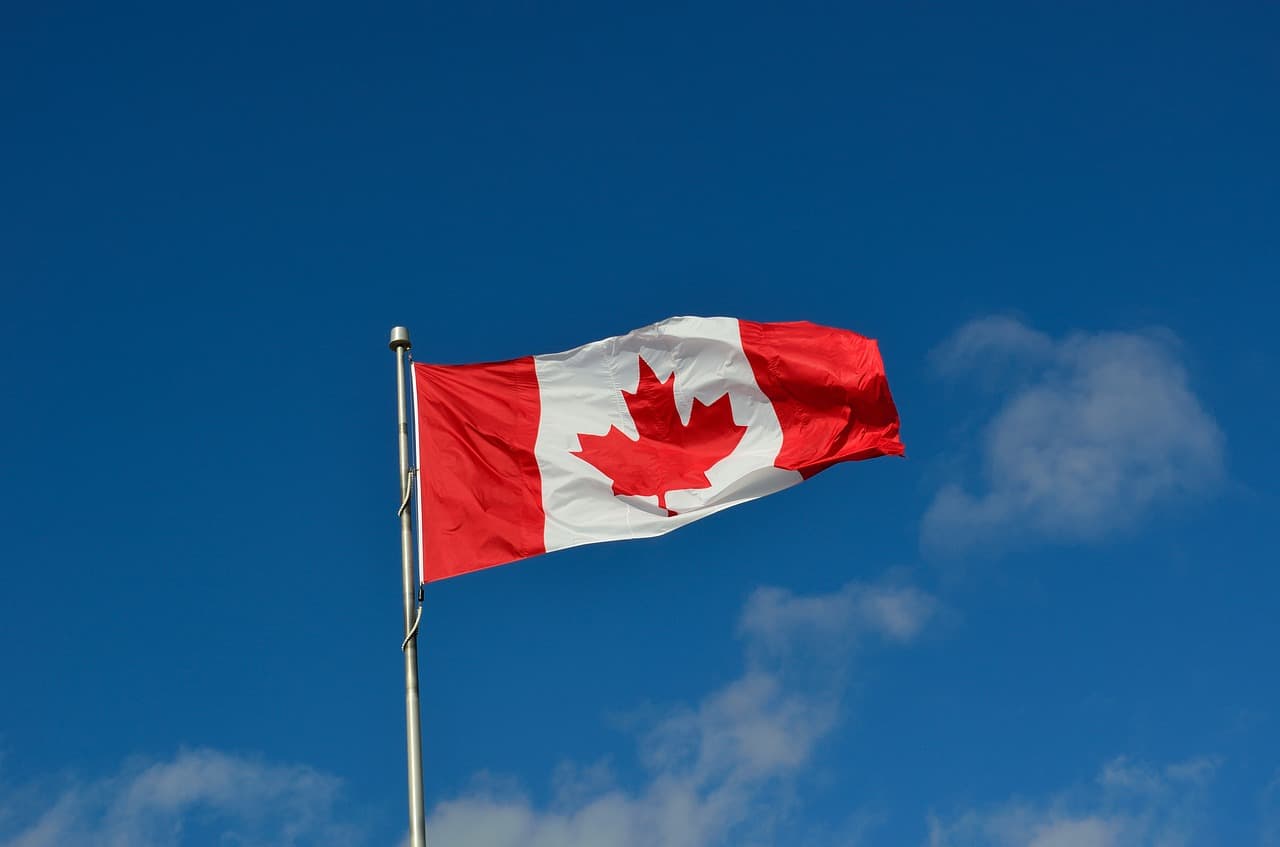
The maple leaf in its flag also symbolizes Canada's natural resources.
Aside from its abstract meanings, the maple leaf in the middle of the flag symbolizes the Canada’s cultural heritage and natural resources.
It took over 35 years for Canada to choose its flag.
Overall, it took the Canadian parliament more than 35 years to settle on what flag to use for the country. Its red and white flag with the iconic maple leaf was formally launched on February 15, 1965. Thus, the country celebrates ‘National Flag of Canada Day’ every February 15th. How’s that for cool Canada facts?
Canada's indigenous people used maple sap as a food staple.
Aside from the fact that the maple leaf represents Canada’s abundant natural resources, it also references how indigenous peoples used maple sap as a food staple before the European settlers arrived. Definitely one of the more symbolic Canada facts.
Canada supplies more than 70% of maple syrup to the world.
From pre-colonial times until today, the maple tree remains vital to the economy of Canada. If the flag wasn’t any indication, Canada supplies more than 70% of the world’s maple syrup produce.
Canada ranks 7th in the world's largest producers of oil.
Aside from its maple produce, the gas and oil industry play important parts in the Canadian economy. Currently, Canada ranks as one of the global leaders in oil production per capita.
Western Canada holds its biggest oil reserves.
Canada has its largest onshore reserves in the western provinces of Alberta and Saskatchewan. There are also oil offshores near the provinces of Nova Scotia and Newfoundland.
Canada exports coal to several Asian countries.
In terms of natural riches, Canada also stands out for its enormous coal deposits. Along with its other resources, Canada’s coal deposits boost its economy through exporting, particularly to several Asian countries. Additionally, some provinces like Quebec have rich uranium deposits along with many mines.
Canada also has many wind farms.
While coal may not be sustainable, Canada also leads the world in wind energy production. Around 8 of Canada’s provinces have the largest wind farms in Canada. In particular, Quebec’s Seigneurie de Beaupré Wind Farms is the largest in the country with a capacity of more than 360 MW.
Canada has a huge manufacturing industry.
The manufacturing sector is one of the biggest catalysts of the Canadian economy. Some of its biggest manufacturing sectors are for motor vehicles, machinery, aerospace, and food manufacturing.
Some big American car brands are usually made in Canada.
The central province of Ontario has produced cars for General Motors, Chrysler, and Ford for more than 50 years already.
Around 22 million tourists visit Canada every year.
Due to Canada’s diverse geography, culture, and history, Canada has established itself as one of the world’s prime tourist destinations. The country’s hospitality industry employs more than 1.5 million people and welcomes around 22 million international tourists each year. In total, tourists provide an annual revenue of approximately $90 billion to Canada’s GDP.
Canada already hosted three Olympic Games.
To date, Canada has hosted three Olympic Games. It began with the 1976 Summer Olympics in Montreal, followed by the 1988 Winter Olympics in Calgary. In 2010, it hosted the Winter Olympics in Vancouver.
There have been 3 Canadian teams in the NBA.
Of all Canadian teams in the NBA, the only one still functioning is the Toronto Raptors founded in 1995. Founded in the same year, the Vancouver Grizzlies moved to Memphis by 2001. Finally, the Toronto Huskies only played for a year in 1946 until it became defunct in 1947.
Canada won its first NBA title in 2019.
More than 70 years after joining the National Basketball Association, Canada finally won its first NBA championship with the Toronto Raptors in 2019. For this season, the Toronto Raptors’ small forward Kawhi Leonard also claimed the title as the finals’ most valuable player.
Toronto Raptor's victory was widely celebrated.
After winning its first NBA championship in 2019, Canadians filled Toronto’s streets to cherish the moment. On behalf of the whole country, Prime Minister Justin Trudeau also tweeted in celebration.
History made! @Raptors, it’s time to bring that championship to Canada! #WeTheNorth
— Justin Trudeau (@JustinTrudeau) May 26, 2019
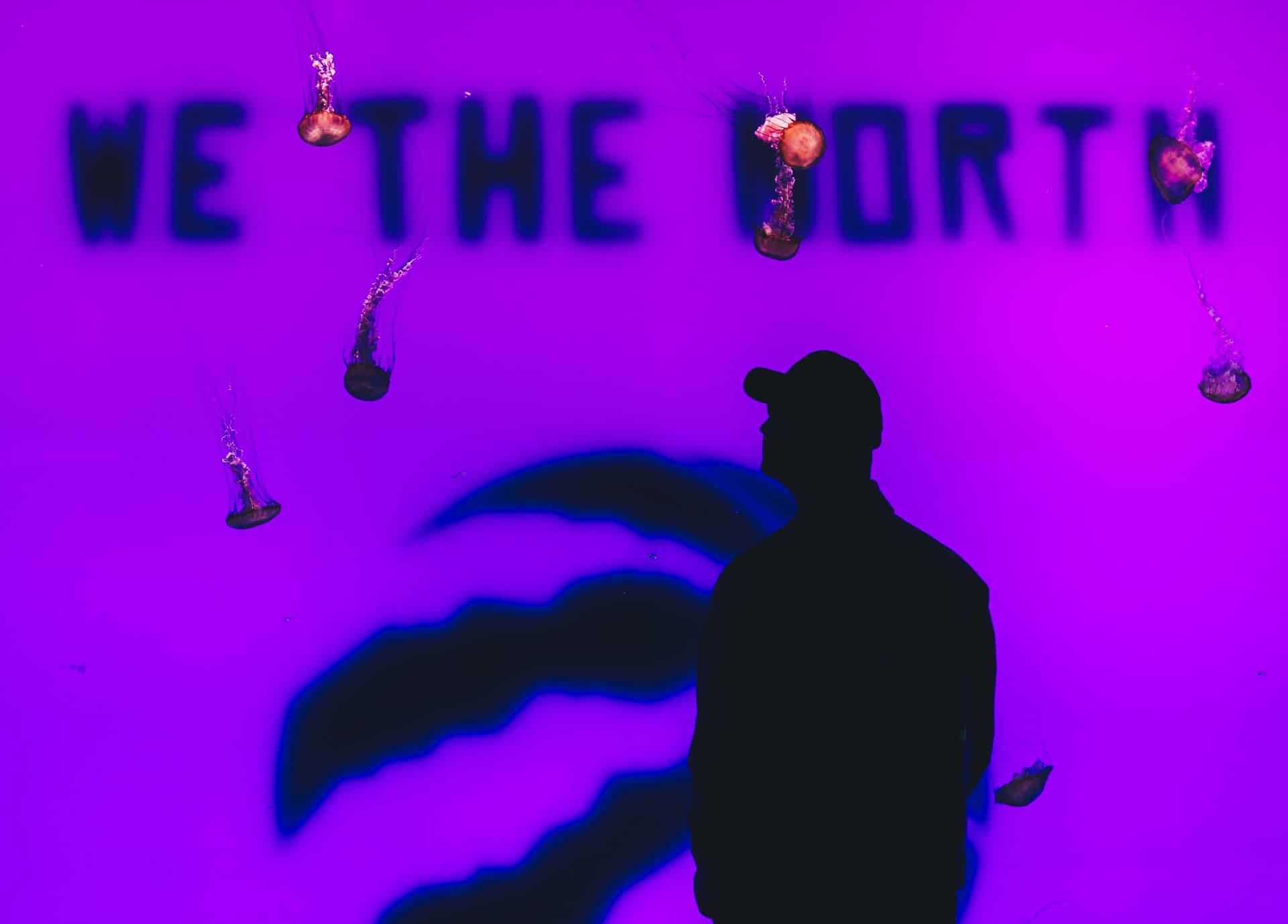
The 1st of July is the celebration of Canada Day.
This day commemorates the agreement within the British North America Ac, now known as the Constitution Act 1867. In addition, the celebration signifies the Confederation of the British colonies into four regions: New Brunswick, Nova Scotia, Quebec, and Ontario.
Canada Day was once called 'Dominion Day'.
Coming from the French word ‘Fete du Dominion,’ Canada Day used to be called Dominion day until the Canada Act’s passing in 1982. It’s important to note that once this day falls on a Sunday, the holiday will be observed on the 2nd of July.
Canada Day is popular in its nickname "Canada's birthday," especially to the press.
However, the term seems to oversimplify the country’s milestone. At its core, Canada day honors how Canada has achieved an advanced political control and governance of the country.
Canada is a Parliamentary Democracy and a Prime Minister is leading it.
Although it is a Parliamentary Democracy, Canada also operates under a constitutional monarchy. The Queen functions as the executive authority and head of state, while the Prime Minister serves as the head of government. Furthermore, the Parliamentary Democracy has three divisions: the House of Commons, the Senate, and the Sovereign.
Canada has established its constitution in 1982.
As of 1982, Canada has become a completely independent country but still part of the British Commonwealth. In line with this, the British royal family does not receive any money from Canadian citizens. However, using Canadian funds is necessary as a support to the Queen when executing her duties or serving as a Queen of Canada abroad.
Farms in Canada are filled with varieties.
Most farms in Canada lies in its countryside or rural areas. These farms grow grain, vegetables, fruits, and raise livestock such as cattle for meat and dairy. These crops are also used to make wine, whiskey, beer, and candies.
Ontario produces 60% of Canadian wines.
The provinces of British Columbia and Ontario are the two biggest wine producers in Canada. Every year, Canada produces more than 50 million liters of wine, with 60% of that production coming from Ontario. Some of the best wines from Ontario are: Cabernet Franc, Merlot, Cabernet Sauvignon, Riesling, Chardonnay, and Sauvignon blanc.

Canada is making wines for over 200 years already.
For over 200 years now, Canada’s early settlers cultivated Vitis vinifera grapes, Vitis labrusca, Vitis Riparia, and other hybrids to produce its wines. In the year 1866, Canada had its first commercial winery opened in Pelee Island, Ontario.
Canada's biggest farms are in the Prairie region.
In Western Canada, there are many land-extensive crop farms that produce oil such as canola and seeds like wheat, barley, and other common crops.
The United States is the biggest importer of Canada's honey.
Each year, Canada produces more than 70 million lbs of honey. Out of this amount, about 35 to 40 million lbs are exported to the United States.
Canada has a smaller fishing industry.
Although the country is relatively surrounded by waters, fishing is not a big industry in Canada. In total, it only employs around 75,000 people. Nevertheless, its fishing industry contributes more than $5 billion to the Canadian economy annually.
Poutine is the national dish of Canada.
Known as Canada’s national dish, poutine combines French fries, cheese, and gravy for a savory meal. Although many international cuisines have claimed that they “invented” poutine, its creator has never been confirmed. Definitely one for delicious Canada facts!
Montreal-style Smoked Meat is Canada's signature sandwich.
Montreal-style Smoked Meat is a salted beef brisket, much like pastrami. Before the smoking process, the meat is cured for a week using an array of spices. Often served with rye bread with mustard, Montreal-style Smoked Meat is a perfect partner for poutine.
Bannock is the best traditional cuisine in Canada.
This versatile and savory bread has been a Canadian staple from the earliest indigenous people. Also known as fry bread, Bannock is considered a simple bread that is easy to make.
Nowadays, it already has a baked version as well as different varieties and twists in cafes and bakeries. Now that’s one of the Canada facts you’d have to taste for yourself.
Nanaimo bars are a trademark no-bake Canadian dessert.
Aside from butter tarts, and Montreal-style bagels, locals usually indulge in nanaimo bars made of wafers, nuts, and coconuts in custard. Another traditional Canadian dessert is Beavertails, or deep-fried dough covered in a variety of toppings.
The Nanaimo bar was voted as "Canada's Favourite Confection."
The Nanaimo bar got its name from the city of Nanaimo, British Columbia. The first documented printed copy of the Nanaimo bar’s recipe appeared in the prized cookbook of Edith Adams in 1953. Since then, Nanaimo bar’s popularity continued to rise, eventually claiming the title for Canada’s favorite confection.
Lacrosse is Canada's national summer sport.
Aside from being Canada’s top summer activity, Lacrosse is also the oldest organized sport in North America. Played in teams, the main goal for lacrosse is hitting the ball into the enemy’s net using sticks.
Ice hockey is Canada's national winter sport.
While lacrosse is Canada’s summer sport, ice hockey is its choice sport for the winter. Moreover, ice hockey is the third-most-popular sport for kids in Canada with over 14 million fans across the country.
There are 7 major sports in Canada.
Apart from ice hockey and lacrosse, other sports such as soccer, curling, baseball, gridiron football, and basketball also draws millions of fans.
The first prime minister of Canada was born in Scotland.
Appointed in 1867, Sir John Alexander Macdonald served as the first prime minister of Canada. Interestingly, Prime Minister Macdonald was born in Scotland when his family decided to migrate to the Province of Upper Canada which is known today as Ontario.
Macdonald was the second-longest serving Prime Minister of Canada.
From 1867 , Sir John Alexander Macdonald became Canada’s first prime minister until 1873. After another Prime Minister’s term, Sir John Alexander Macdonald was re-appointed in 1878, serving the country until 1891. This feat earns him the title of the second-longest serving Prime Minister in Canada’s history.
Mackenzie King has served the most terms as a Prime Minister of Canada.
With three non-consecutive terms, William Lyon Mackenzie King served as Canada’s Prime Minister for a sum of of 21 years and 154 days. First appointed in 1921, King got reappointed in 1926 and 1935.
Cricket almost became Canada's national sport.
Canada’s first Prime Minister, Sir John Alexander Macdonald, proposed cricket as the national sport of Canada. However, due to the impact and popularity of other sports in the United States to Canada and even around the world, Canadians lost interest in cricket.
Ontario native James Naismith invented basketball.
Born and raised in Ontario, Canada, James Naismith was a Christian chaplain, physician, and sports coach. In 1891, he moved to Springfield, Massachusetts where he invented the game of basketball. Naismith also founded the basketball program at Kansas University and wrote the original basketball rule book. How’s that for neat Canada facts?
James Naismith is now a Canadian sports Hall of Famer.
Seven years after inventing basketball, Naismith earned his medical degree in 1898. Later on, he became the athletic director and coach of the Kansas Jayhawks. Naismith still pursued his passion and witnessed its mainstream success in 1904 as basketball got recognized as an Olympic sport.
In line with this, James Naismith received many Hall of Fame inductions as well as a sports trophy named after him.
Canada Goose is one of the biggest winter clothing companies in Canada.
The Canadian holding company, Canada Goose Holdings Inc. is a publicly-traded company (traded under the stock code GOOS). In 1957, Sam Tick founded the company under the name Metro Sportswear Ltd.To this day, Canada Goose remains as one of the biggest clothing companies in the country.

The Royal Bank of Canada is the country's largest bank.
With a market capitalization of $145 billion, the Royal Bank of Canada is the country’s largest bank. Currently, it has 80,000 employees and roughly 16 million clients. Moreover, Royal Bank of Canada is a publicly-traded company under the stock code RCB.
The bank focuses its services on retail banking, investment banking, corporate banking, private baking, wealth management, mortgage loans, credit cards, and insurance.
There a video game called "Death Road to Canada."
Released in 2016, Death Road to Canada is an action RPG that lets you navigate a post-apocalyptic world while fighting zombies.
The brand Canada Dry is more than 110 years old.
Most famous for its ginger ale, Canada Dry has served beverages for over 100 years now. The word “dry” promotes the product as “not sweet” and as dry as wine.
Canada Dry is now owned by an American company.
In 2019, Canada Dry received a lawsuit from the U.S. Government, accusing the company of false health claims for a product with only trace amounts of ginger. As a result, Canada Dry had to erase these claims from its marketing.
Alberta, Manitoba, and Québec allow people to drink as early as 18 years old.
In contrast to the United States’ legal drinking age of 21, the minimum legal drinking age in Alberta, Manitoba, and Québec is 18 years old. However, apart from those 3 places, Canada enforces a minimum drinking age of 19. Definitely one of the Canada facts to remember if you plan on visiting soon.
Canadian Thanksgiving occurs every second Monday of October.
Canada celebrates Canadian Thanksgiving annually every second Monday of October. Much like its American counterpart, Canadian Thanksgiving aims to honor all the blessings and harvest from the past year.
Before, Canadian Thanksgiving did not have a fixed date.
Although Canada has celebrated Thanksgiving since 1879, it wasn’t until 1957 that the holiday had a fixed date. The observance was finalized after then-Governor General Vincent Massy issued a proclamation in January 1957.
Roman Catholicism is the most dominant religion in Canada.
Practiced by 39% of the population, Roman Catholicism is the biggest religion in Canada. Meanwhile, 24% of its population practices Protestantism, while 25% are undecided. The remaining 12% of its population practice Anglicanism, Hinduism, Sikhism, Islam, and Buddhism.
Education is free in Canada.
One huge benefit of being a Canadian citizen is how its government handles education. Thus, Canadians enjoy free to very minimal education fees until high school. Additionally, most public institutions offer relatively low fees for post-secondary education, often subsidized by the Canadian Government.

Healthcare is also free in Canda.
Free education is not the only advantage of Canadians. The government also covers most costs for health care, such as hospitalizations, check-ups, and other procedures. However, others would argue that Canadians still pay for their medical services indirectly through their taxes.
Canadians have an average life expectancy of 82.52 years.
According to reports, more than 85% of Canadians express satisfaction with their healthcare services. In contrast to the United States, Canada spends less per capita on health-care and has a longer life expectancy of 82.52 years compared to the United States’ 78.93 years.
You can easily apply for Permanent Residence in Canada.
Due to Canada’s relatively low population, the government tries to make it easier to apply for a Permanent Resident status. As long as an applicant has a good background, solid working experience, a university degree, and clean records, it’s likely they would qualify. However, the process may take several months or years as it requires a lot of paperwork.
Americans still need to bring their passport to enter Canada.
While US citizen’s don’t need a visa to enter Canada, the law requires all persons to present proofs of identity and citizenship. For non-Canadians, a valid passport is always necessary. If you are an American citizen under 16 years old, you only need to present proof of U.S. citizenship.
Canada has 20 UNESCO heritage sites.
Out of these heritage spots are 9 cultural sites, 10 natural sites, and one mixed site. The cultural sites include Head-Smashed-In Buffalo Jump, Historic District of Old Quebec, Old Town Lunenburg, and Red Bay Basque Whaling Station.
Some of the most famous Canadian natural UNESCO sites include Dinosaur Provincial Park, Wood Buffalo National Park, Canadian Rocky Mountain Parks, and Gros Morne National Park.
The Head-Smashed-In Buffalo Jump was used to hunt Plains bison.
As the name suggests, the Head-Smashed-In Buffalo Jump in Southern Alberta features a cliff formation that native people used for hunting Plains bison.
Furthermore, Old Quebec is filled with museums and landmarks surrounded by fortifications dating back to the 17th century. Meanwhile, the Old Town Lunenburg preserves the original British colonial settlement in North America from the 18th century.
The Niagara Falls sits on the border of Ontario and New York.
One of the world’s most famous falls lies in the borders of Ontario, Canada, and New York, United States. Niagara Falls is a collection of three waterfalls, namely the Horseshoe Falls, American Falls, and Bridal Veil Falls. Once combined, the Niagara Falls can pour 3,160 tons of water per second, which is one of the highest flow rates on Earth.
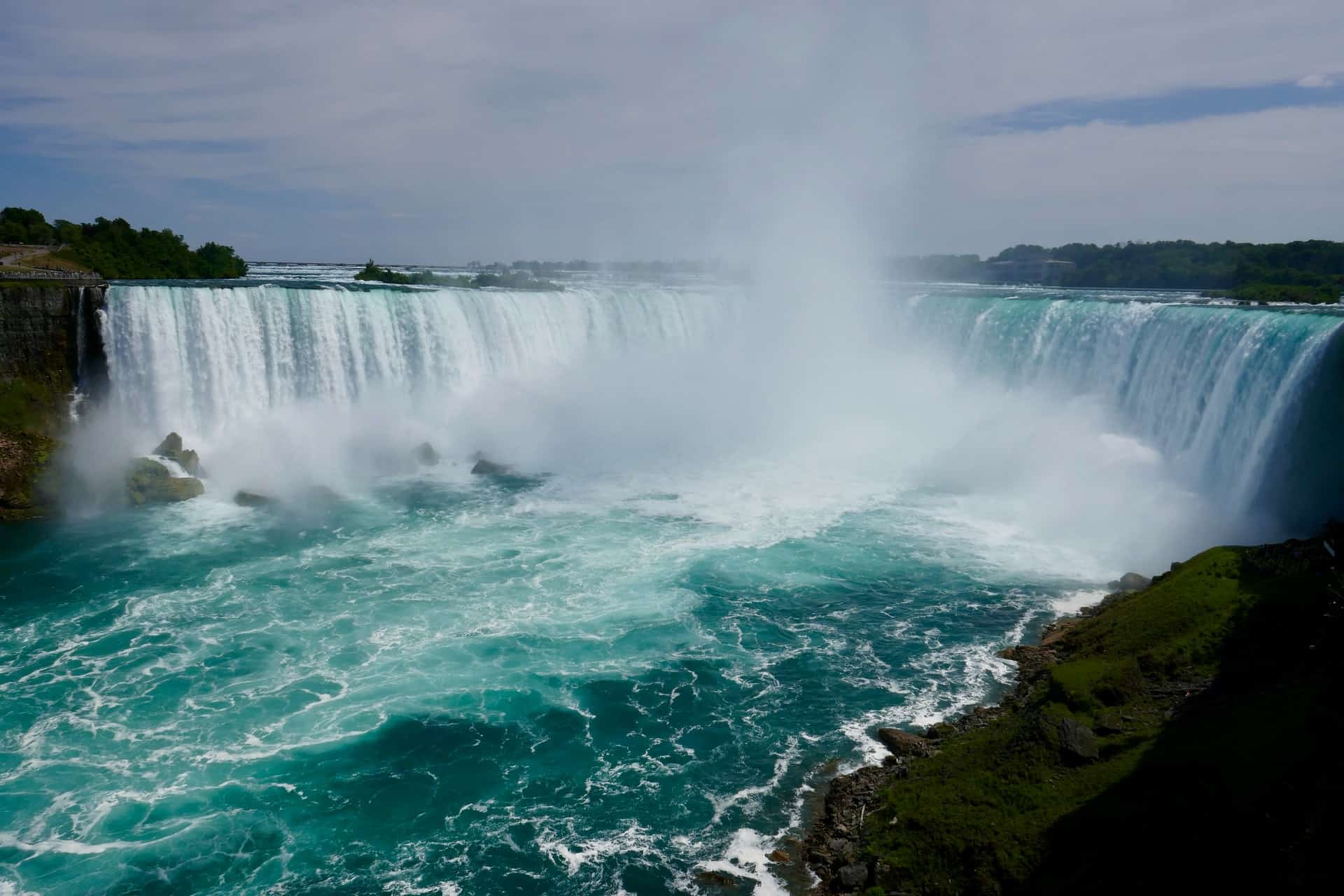
The Niagara Falls provides most of the hydropower in Ontario and New York.
Since 1881, Niagara Falls has provided a significant amount of electricity to its bordering lands. Currently, it provides more than 25% of the electricity in Ontario and New York from its surrounding hydropower plants.
MasterChef Canada also airs outside the country.
First aired on January 20th, 2014, the reality cooking show has episodes every Tuesday night on CTV and the Cooking Channel in the United States. Additionally, MasterChef Canada also airs in other countries such as Italy, Spain, and Sweden.
Canada is home to some of the world's biggest islands.
Aside from being the largest island in Canada, the Baffin Islands also ranks as the 5th biggest island in the world. At 507,451 km², it is more than twice the size of Great Britain. Additionally, the Ellesmere Island and Victoria Island in Canada also measure just a little smaller than the state of Michigan, United States at 250,493 sq km.
Was this page helpful?
Our commitment to delivering trustworthy and engaging content is at the heart of what we do. Each fact on our site is contributed by real users like you, bringing a wealth of diverse insights and information. To ensure the highest standards of accuracy and reliability, our dedicated editors meticulously review each submission. This process guarantees that the facts we share are not only fascinating but also credible. Trust in our commitment to quality and authenticity as you explore and learn with us.


